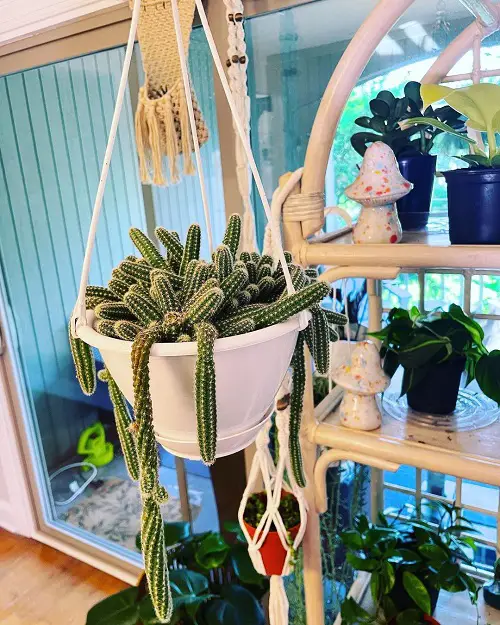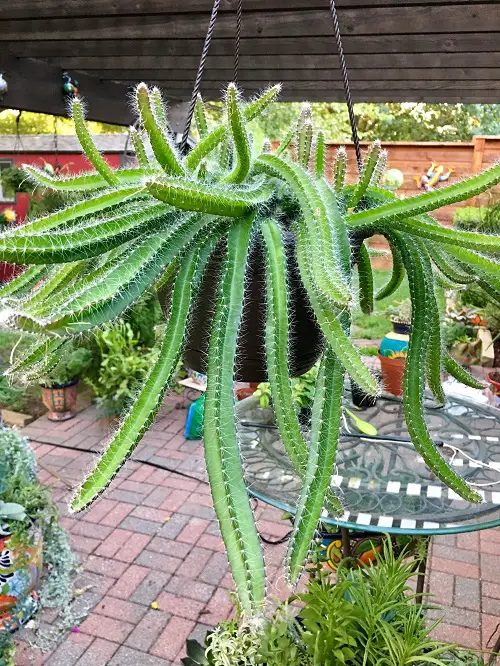Discover the secrets to keeping your Dog Tail Cactus healthy and thriving with our easy-to-follow tips! We have some special secrets too!
With its distinctive appearance and low-maintenance needs, Dog Tail Cactus is a great choice for anyone looking to add a touch of desert chic to their indoor garden. Let us take you through everything you need to know to keep it thriving!
Botanical Name: Strophocactus testudo
Here is the best Fern Leaf Cactus Care and Growing Guide
Dog Tail Cactus Plant Information
The Dog Tail Cactus is a unique and visually striking plant that is sure to turn heads. With its long, trailing stems covered in spiky leaves, this cactus has a distinct appearance that sets it apart from other plants.
Originating from arid regions, the Dog Tail Cactus is surprisingly adaptable and can thrive in a variety of indoor environments. Its ability to tolerate drought makes it a great choice for busy plant parents, while its preference for bright, indirect light makes it a versatile addition to any room.
As the Dog Tail Cactus grows, it begins to trail and vine, creating a beautiful display that is both striking and unique. Its distinctive growth habit is just one of the many reasons why this cactus is a popular choice among plant enthusiasts.
Here are some popular cactus types you can grow easily
How to Grow Dog Tail Cactus?
- For propagating by seeds, plant them in a well-draining soil mix. The soil should be kept moist but not soggy. The seeds should be planted in a warm, sunny location and should germinate in 2-3 weeks.
- To propagate by offsets, remove them carefully from the mother plant and plant in a well-draining soil mix. The soil should be kept moist but not soggy. The offsets should be planted in a warm, sunny location and should produce roots in 2-3 weeks.
- To grow it using cuttings, snip mature, healthy stems carefully from the mother plant and plant in a well-draining soil mix. The soil should be kept moist but not soggy. The cuttings should be planted in a warm, sunny location and should produce roots in 2-3 weeks.
Regardless of the propagation method used, the Dog Tail Cactus should be given plenty of bright light and watered when the soil is dry.
Requirements for Growing Dog Tail Cactus

Sunlight
The Dog Tail Cactus prefers bright, indirect light to thrive, but direct sunlight can cause leaf scorching and discoloration. A good rule of thumb is to place your cactus near a window with a sheer curtain or in a bright, well-lit room.
The best is to expose the plant to the mild morning sunlight for 2-3 hours every day.
Soil
Choosing the right soil mix is essential for the health of your Dog Tail Cactus. This cactus prefers well-draining soil that is specifically designed for cacti and succulents.
A mix of sand, perlite, and peat moss is a good option to ensure proper drainage. Avoid using regular potting soil, which can hold too much moisture and cause root rot.
Water
The Dog Tail Cactus is drought-tolerant, meaning it can go long periods without water. Overwatering can lead to root rot, so it’s important to let the soil dry out completely between waterings.
Temperature
As a desert plant, the Dog Tail Cactus thrives in warm temperatures. It prefers a temperature range of 60-100°F (15-40°C) during the day and 50-60°F (10-15°C) at night.
Keep in mind that drastic temperature changes can shock the plant, so avoid placing it near drafty windows or air conditioning units.
Humidity
The Dog Tail Cactus prefers a dry environment and does not require high humidity levels. In fact, high humidity can lead to fungal diseases and other issues. As long as you avoid overwatering and keep the plant in a well-ventilated area, humidity levels should not be a concern.
Dog Tail Cactus Care

felicianos_jungle
Fertilizer
The Dog Tail Cactus does not require much fertilizer, but a light application during the growing season can help promote healthy growth.
Use a balanced, water-soluble fertilizer once in 4-6 weeks after diluting it to 1/2 of its strength. Avoid fertilizing in the winter months, as this can cause damage to the plant.
Read about the best fertilizer for cacti
Pruning
Pruning is not necessary for the Dog Tail Cactus, but you can trim off any damaged or yellowed leaves with a clean pair of scissors or pruning shears.
Be careful not to remove too many leaves, as this can stress the plant and slow down its growth. Additionally, make sure to wear gloves to protect your hands from the cactus’s spines.
Pest and Diseases
The Dog Tail Cactus is generally a hardy plant that is not prone to many pest and disease problems. However, overwatering can lead to root rot, and mealybugs and spider mites can occasionally infest the plant.
To prevent these issues, make sure to let the soil dry out completely between waterings and keep an eye out for any signs of pests. If you do spot an infestation, treat it immediately with a pesticide.



